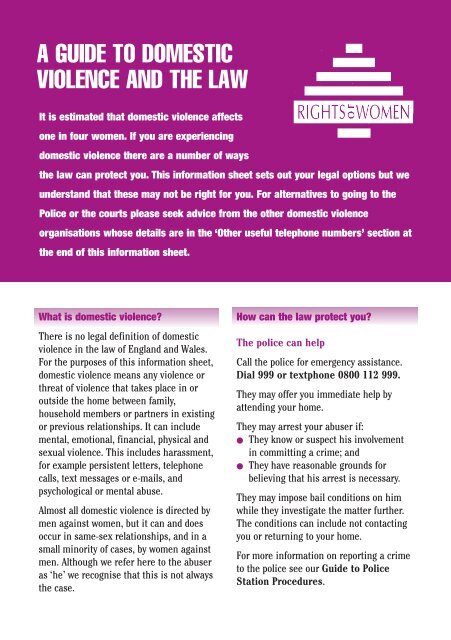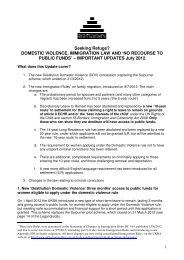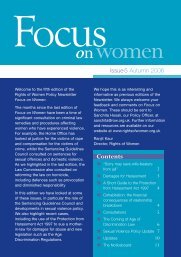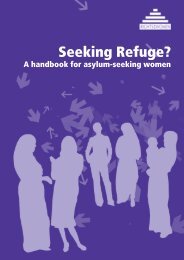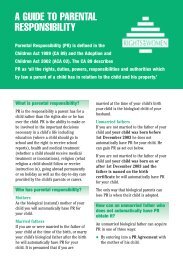domestic violence -pn2415 - Rights of Women
domestic violence -pn2415 - Rights of Women
domestic violence -pn2415 - Rights of Women
You also want an ePaper? Increase the reach of your titles
YUMPU automatically turns print PDFs into web optimized ePapers that Google loves.
A GUIDE TO DOMESTIC<br />
VIOLENCE AND THE LAW<br />
It is estimated that <strong>domestic</strong> <strong>violence</strong> affects<br />
one in four women. If you are experiencing<br />
<strong>domestic</strong> <strong>violence</strong> there are a number <strong>of</strong> ways<br />
the law can protect you. This information sheet sets out your legal options but we<br />
understand that these may not be right for you. For alternatives to going to the<br />
Police or the courts please seek advice from the other <strong>domestic</strong> <strong>violence</strong><br />
organisations whose details are in the ‘Other useful telephone numbers’ section at<br />
the end <strong>of</strong> this information sheet.<br />
What is <strong>domestic</strong> <strong>violence</strong>?<br />
There is no legal definition <strong>of</strong> <strong>domestic</strong><br />
<strong>violence</strong> in the law <strong>of</strong> England and Wales.<br />
For the purposes <strong>of</strong> this information sheet,<br />
<strong>domestic</strong> <strong>violence</strong> means any <strong>violence</strong> or<br />
threat <strong>of</strong> <strong>violence</strong> that takes place in or<br />
outside the home between family,<br />
household members or partners in existing<br />
or previous relationships. It can include<br />
mental, emotional, financial, physical and<br />
sexual <strong>violence</strong>. This includes harassment,<br />
for example persistent letters, telephone<br />
calls, text messages or e-mails, and<br />
psychological or mental abuse.<br />
Almost all <strong>domestic</strong> <strong>violence</strong> is directed by<br />
men against women, but it can and does<br />
occur in same-sex relationships, and in a<br />
small minority <strong>of</strong> cases, by women against<br />
men. Although we refer here to the abuser<br />
as ‘he’ we recognise that this is not always<br />
the case.<br />
How can the law protect you?<br />
The police can help<br />
Call the police for emergency assistance.<br />
Dial 999 or textphone 0800 112 999.<br />
They may <strong>of</strong>fer you immediate help by<br />
attending your home.<br />
They may arrest your abuser if:<br />
● They know or suspect his involvement<br />
in committing a crime; and<br />
● They have reasonable grounds for<br />
believing that his arrest is necessary.<br />
They may impose bail conditions on him<br />
while they investigate the matter further.<br />
The conditions can include not contacting<br />
you or returning to your home.<br />
For more information on reporting a crime<br />
to the police see our Guide to Police<br />
Station Procedures.
When the police have completed their<br />
investigation they will pass the information<br />
they have on to the Crown Prosecution<br />
Service (the CPS) who will decide whether<br />
he will be charged with a criminal <strong>of</strong>fence<br />
or not. The CPS can only charge someone<br />
with an <strong>of</strong>fence if they have enough<br />
evidence to provide a ‘realistic prospect <strong>of</strong><br />
conviction’ and it is in the public interest.<br />
Once he is charged he will go before a<br />
court. The court can either remand him in<br />
custody until his trial or release him on<br />
bail. The Court can impose any bail<br />
condition on him that it thinks is<br />
necessary.<br />
If the CPS decide not to charge him with<br />
an <strong>of</strong>fence he may be cautioned (if he<br />
accepts responsibility for his behaviour) or<br />
no further action may be taken against<br />
him. A record <strong>of</strong> what happened will be<br />
kept by the police which may be helpful if<br />
you decide to get an injunction against him<br />
or you need help from the police in the<br />
future.<br />
Depending on what <strong>of</strong>fence(s) he has<br />
committed, under the Protection From<br />
Harassment Act 1997 (PFHA) the<br />
criminal court may make a restraining<br />
order against your abuser. Under the<br />
Domestic Violence Crime and Victims<br />
Act 2004 (DVCVA) the powers <strong>of</strong> the<br />
criminal court will be strengthened to<br />
enable them to impose a restraining order<br />
on your abuser even if he is found not<br />
guilty <strong>of</strong> committing an <strong>of</strong>fence. Seek legal<br />
advice about whether this has become law<br />
and applies to you.<br />
If you have experienced <strong>domestic</strong> <strong>violence</strong><br />
you should receive an enhanced service<br />
from the police, CPS and other agencies<br />
involved in the criminal justice system.<br />
This includes being informed within 24<br />
hours if he is arrested, charged or released<br />
on bail. For more information about this<br />
see The Code <strong>of</strong> Practice for Victims <strong>of</strong><br />
Crime published by the Office for Criminal<br />
Justice Reform (see below).<br />
The police and CPS take <strong>domestic</strong> <strong>violence</strong><br />
very seriously and they may take action<br />
against your abuser even if you do not<br />
want them to. If the case goes to trial the<br />
court can order you to attend and give<br />
evidence against your abuser. For many<br />
reasons, women decide they do not want to<br />
involve the police. See Other useful<br />
telephone numbers at the end <strong>of</strong> this<br />
information sheet for details <strong>of</strong> support<br />
organisations who may be able to help you<br />
decide what to do.<br />
You can apply for an injunction from<br />
the Court<br />
An injunction is a type <strong>of</strong> court order which<br />
forbids your abuser from doing certain<br />
things, such as being violent and abusive<br />
towards you, or orders him to do certain<br />
things, such as leave your home. If your<br />
abuser disobeys the order he can be<br />
punished by being fined or sent to prison.<br />
There are two kinds <strong>of</strong> injunction available<br />
under the Family Law Act 1996 – nonmolestation<br />
orders and occupation<br />
orders.<br />
You can only apply for these types <strong>of</strong> orders<br />
if you are ‘associated’ to your abuser. You<br />
are associated to your abuser if you:<br />
● are or were married or in a civil<br />
partnership;<br />
● are or were living together as a couple<br />
(including same-sex couples);
● are or were engaged to be married or<br />
agreed to enter into a civil partnership;<br />
● are or were living in the same<br />
household (this includes flat mates);<br />
● are relatives (this includes half blood<br />
and step relatives, people who would be<br />
in-laws if you were married or in a civil<br />
partnership and now includes first<br />
cousins);<br />
● are parents <strong>of</strong> the same child or<br />
involved in the same family court case.<br />
The DVCVA will also create a new<br />
category <strong>of</strong>:<br />
● are or were involved in an intimate<br />
relationship <strong>of</strong> significant duration.<br />
Seek legal advice to find out whether this<br />
has become law and applies to you.<br />
Before making your application we<br />
would strongly advise that you check<br />
whether you are legally ‘associated’ to<br />
your abuser. If you are not, you may be<br />
able to apply for a different kind <strong>of</strong><br />
injunction under different legislation<br />
such as the PFHA.<br />
A non-molestation order will protect<br />
you from <strong>violence</strong> or harassment. Your<br />
abuser does not have to have been<br />
physically violent towards you. It can:<br />
● forbid your abuser from being violent<br />
towards you or any children in your<br />
family, from threatening <strong>violence</strong> or<br />
from harassing, pestering or<br />
intimidating you in many different<br />
ways;<br />
● stop him from coming within a certain<br />
distance <strong>of</strong> your home;<br />
● forbid him from damaging or disposing<br />
<strong>of</strong> your belongings.<br />
You can apply for a non-molestation order<br />
even if you want to continue living with<br />
him.<br />
When deciding whether to grant a nonmolestation<br />
order the court will consider<br />
all <strong>of</strong> your circumstances, including the<br />
need to secure the health, safety and well<br />
being <strong>of</strong> you and any children. You<br />
therefore need to show the court how your<br />
health, safety or well-being or that <strong>of</strong> your<br />
children is at risk if you are not granted<br />
the order.<br />
An occupation order deals with who<br />
lives in your home. There are different<br />
types <strong>of</strong> order that the court can make. It<br />
can:<br />
● order your abuser to move out <strong>of</strong> the<br />
home or to stay away from the home;<br />
● order him to stay a certain distance<br />
away from the home;<br />
● order him to stay in certain parts <strong>of</strong><br />
your home;<br />
● order him to allow you back into the<br />
home if he has locked you out;<br />
● order him to pay the mortgage, rent or<br />
bills for the home;<br />
● order him not to damage or destroy the<br />
home.<br />
The type <strong>of</strong> occupation order you can<br />
apply for depends on whether you or<br />
your abuser are legally entitled to<br />
occupy the property and on the type <strong>of</strong><br />
relationship you have. Before making<br />
your application we would strongly<br />
advise you to seek legal advice.<br />
To decide whether to grant an occupation<br />
order the court will consider things like the<br />
housing needs and resources <strong>of</strong> you, your
abuser and any children, the financial<br />
resources <strong>of</strong> you both, the likely effect any<br />
order, or not making an order, will have on<br />
you, your abuser and any children, you and<br />
your abuser’s behaviour to one another and<br />
the length <strong>of</strong> your relationship.<br />
The court can make both a nonmolestation<br />
order and an occupation<br />
order if it is appropriate.<br />
If the court is satisfied that your abuser<br />
has been violent or has threatened<br />
<strong>violence</strong> against you it can attach a power<br />
<strong>of</strong> arrest to your order. This means that if<br />
your abuser disobeys the order the Police<br />
can arrest him and bring him to court to be<br />
punished.<br />
The DVCVA will make it a criminal<br />
<strong>of</strong>fence to disobey a non-molestation<br />
order. This will mean that once it becomes<br />
law breaches <strong>of</strong> non-molestation orders<br />
will be dealt with in the criminal courts<br />
and not in the civil court. Seek legal advice<br />
to find out whether this has become law<br />
and applies to you. Breaches <strong>of</strong> occupation<br />
orders will continue to be dealt with in the<br />
civil court.<br />
Court procedure<br />
You will need to complete an application<br />
form FL401 and prepare a sworn statement<br />
giving details <strong>of</strong> your relationship, any<br />
relevant children, past history <strong>of</strong> <strong>violence</strong><br />
and the most recent events which led you<br />
to make the application. You will also have<br />
to attend one or possibly more court<br />
hearings.<br />
You can make your application in either<br />
your local Family Proceedings Court or<br />
County Court.<br />
If you need an injunction urgently or are<br />
scared that your abuser will cause you<br />
further harm if he is aware you are going<br />
to court you can make your application<br />
“without notice” to him. This means that<br />
the court can consider your application<br />
without your abuser being present. The<br />
court will have to be persuaded that there<br />
are good reasons to make the order<br />
urgently. A supporting report from the<br />
police or your Doctor may help.<br />
Your abuser must be handed the order<br />
personally together with a copy <strong>of</strong> your<br />
application and statement. You are only<br />
protected once he is aware <strong>of</strong> the<br />
order.<br />
If you applied for and were granted your<br />
order without notice to your abuser the<br />
court is likely to organise another hearing<br />
to give him an opportunity to put his side<br />
<strong>of</strong> the story. You will have to attend this<br />
hearing and you may have to give<br />
evidence. The Court will consider all the<br />
evidence and decide whether to grant a<br />
further order or not.<br />
Depending on the facts <strong>of</strong> your case and<br />
your financial circumstances you may be<br />
eligible for public funding (formerly Legal<br />
Aid). There are a number <strong>of</strong> conditions to<br />
applying for public funding, including<br />
considering whether your abuser should be<br />
sent a warning letter before you apply to<br />
the court (this will not be appropriate if<br />
you are at risk from further <strong>violence</strong>).<br />
For women who are not eligible for<br />
public funding and cannot afford a<br />
solicitor we have produced the<br />
Domestic Violence DIY Injunction<br />
Handbook which gives a step–by-step
guide to making an application for a<br />
non-molestation and/or occupation<br />
order. To purchase a copy contact our<br />
admin line on 020 7251 6575/6576 or<br />
visit www.rights<strong>of</strong>women.org.uk.<br />
Other options<br />
If you do not wish to involve the police or<br />
apply for an injunction or are unsure, there<br />
are many other organisations who can<br />
<strong>of</strong>fer advice or support (see Other useful<br />
telephone numbers section below).<br />
If you are forced to flee your home because<br />
<strong>of</strong> <strong>domestic</strong> <strong>violence</strong> you can approach your<br />
Local Authority’s Homeless Persons Unit or<br />
Housing Office for help. Under the<br />
Housing Act 1996 and the<br />
Homelessness Act 2002 if you flee your<br />
home permanently or temporarily because<br />
<strong>of</strong> <strong>domestic</strong> <strong>violence</strong> your local authority<br />
has a duty to provide you with temporary<br />
accommodation while they decide whether<br />
you are in priority need for further housing<br />
assistance. You will be considered to be in<br />
priority need if you are vulnerable because<br />
<strong>domestic</strong> <strong>violence</strong> has occurred.<br />
You may be able to get temporary<br />
accommodation for you and your children<br />
in a refuge while you decide what to do<br />
next. Contact the National Domestic<br />
Violence helpline for information about<br />
refuges and other support services.<br />
The law relating to <strong>domestic</strong> <strong>violence</strong><br />
is complex and we have provided a<br />
very basic overview <strong>of</strong> terminology, law<br />
and court practice and procedure. We<br />
would strongly advise you to seek legal<br />
advice by either telephoning our legal<br />
advice line or contacting a solicitor.<br />
Please note that the law referred to in this information sheet is as it stood at<br />
the date <strong>of</strong> publication. The law may have changed since then and accordingly<br />
you are advised to take up to date legal advice. <strong>Rights</strong> <strong>of</strong> <strong>Women</strong> cannot accept<br />
responsibility for any reliance placed on the legal information contained in<br />
this information sheet. This information sheet is designed to give general<br />
information only.<br />
© <strong>Rights</strong> <strong>of</strong> <strong>Women</strong> September 2006
For free confidential legal advice on family law including <strong>domestic</strong> <strong>violence</strong>, divorce<br />
and relationship breakdown, children and contact issues call the <strong>Rights</strong> <strong>of</strong> <strong>Women</strong><br />
Advice line on 020 7251 6577 (telephone) or 020 7490 2562 (textphone).<br />
Tuesday, Wednesday and Thursday 2pm – 4pm and 7pm – 9pm<br />
Friday 12noon – 2pm<br />
For free legal advice on sexual <strong>violence</strong> and the criminal law please call our Sexual<br />
Violence Advice line on 020 7251 8887 (telephone) or 020 7490 2562 (textphone).<br />
Monday 11am – 1pm or Tuesday 10am – 12noon<br />
Other useful telephone numbers<br />
Asian <strong>Women</strong>’s Resource Centre 020 8961 6549 www.asianwomenscentre.org.uk<br />
Broken Rainbow 08452 604 460<br />
(services for LGBT people experiencing <strong>domestic</strong> <strong>violence</strong>) www.brokenrainbow.org.uk<br />
Chinese Information and Advice Centre<br />
<strong>Women</strong>’s Support Project 020 7462 1281 www.ciac.co.uk<br />
Community Legal Service Direct<br />
(for finding a family solicitor) 0845 345 4345 www.clsdirect.org.uk<br />
Criminal Justice System for England and Wales<br />
(includes the Victims’ Code and other useful information) www.cjsonline.gov.uk<br />
Jewish <strong>Women</strong>’s Aid National Helpline 0800 591203 www.jwa.org.uk<br />
Muslim <strong>Women</strong>’s Helpline 020 8908 6715<br />
020 8904 8193 www.mwhl.org<br />
National Domestic Violence Helpline 0808 2000 247 www.womensaid.org.uk<br />
NSPCC Child Protection Line 0808 800 5000 www.nspcc.org.uk<br />
Relate 0845 130 40 10 www.relate.org.uk<br />
Resolution (for finding a family solicitor) 08457 585 671 www.resolution.org.uk<br />
Samaritans 08457 909090 www.samaritans.org.uk<br />
Shelterline 0808 800 4444 www.shelter.org.uk<br />
Southall Black Sisters 020 8571 9595 www.southallblacksisters.org.uk<br />
<strong>Rights</strong> <strong>of</strong> <strong>Women</strong>, 52-54 Featherstone Street, London EC1Y 8RT<br />
Office/Admin: 020 7251 6575/6 textphone: 020 7490 2562<br />
Fax: 020 7490 5377<br />
email: info@row.org.uk<br />
website: www.rights<strong>of</strong>women.org.uk<br />
Industrial and Provident Society No: 23221R


